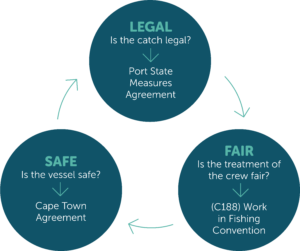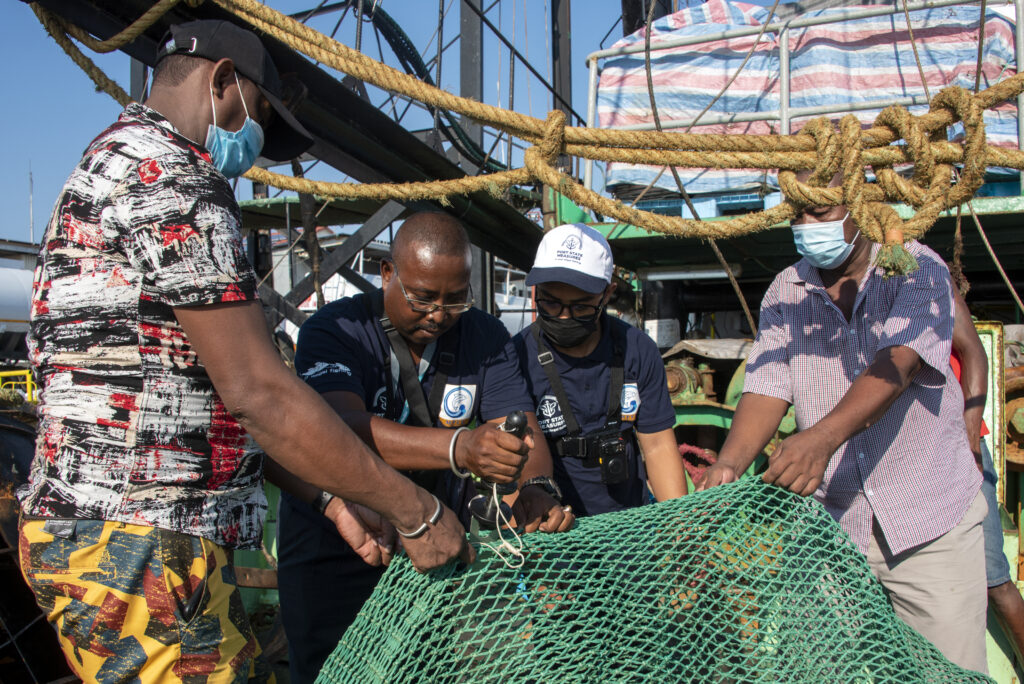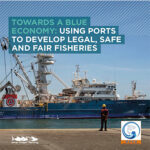By Stop Illegal Fishing:27th Nov, 2021: Port State Measures to Stop Illegal Fishing
Madagascar Advances Interagency Cooperation to Develop Legal, Safe and Fair Fisheries
During a three-day interagency meeting exploring interagency cooperation and mechanisms for developing legal, safe and fair fisheries, His Excellency Paubert Mahatante, Madagascar’s Minister for Fisheries and Blue Economy demonstrated his support to fight illegal, unreported and unregulated (IUU) fishing.
The high-level meeting focussed on harmonising implementation of tools for port state measures, safety and labour. The links between a compliant fisheries sector and successful blue economic growth make this a priority area as Madagascar looks towards the ocean to bring economic, social and food security to its people.
Presentations by representatives from three United Nations agencies highlighted the common agendas and tools that will help deliver safer fishing vessels, decent working conditions and legally caught fish. In recent years the membership of the Food and Agriculture Organization (FAO), the International Maritime Organization (IMO) and the International Labor Organization (ILO) have developed a framework of international instruments to use ports to block illegally caught fish from being landed, to reduce the number of accidents and fatalities and to improve safety and working and living conditions in the fisheries sector.
The three treaties are the FAO Agreement on Port State Measures (PSMA), the IMO Cape Town Agreement (CTA), and the ILO Work in Fishing Convention No. 188 (C188). To become truly effective tools, it is important that the minimum standards and requirements from these international instruments are adopted as widely as possible.

Eric Mostert of the FAO stated, “The PSMA provides a significant opportunity to fight IUU fishing. The FAO has supported Madagascar through support to an assessment of their legal and institutional frameworks, which fed into the development of a strategy for PSMA implementation in Madagascar, prepared in 2019.” He also highlighted several tools and resources developed by FAO to support information sharing and exchange between port, coastal and flag States.
Cagri Kucukyildiz, of the IMO, shared information on the CTA, which features mandatory safety measures for fishing vessels of 24 metres in length and longer and is seen as a “key tool” in combating IUU fishing. It is currently seen as the missing pillar on at-sea vessel safety, but support has grown in recent years with 48 committed to ratify the 2012 Cape Town Agreement on fishing vessel safety at the Torremolinos Ministerial Conference in 2019.
Brandt Wagner, of the ILO, highlighted the links between forced labour and human trafficking and IUU fishing. The benefits of coordinated implementation of C188 and PSMA built on close cooperation between port authorities, maritime and immigration officials and fisheries inspectors is particularly important for exercising control over foreign flagged fishing and support vessels. In addition, cooperation with the marine police, safety, customs, immigration and labour authorities as well as the coastguard or navy are necessary at different stages of risk assessment, inspection and enforcement processes, required to implement port State measures.
A live demonstration on how body worn cameras are being used to support frontline fisheries inspectors as they operate in port was provided. Leading the real-time inspection of a trawler in Mahajanga port, JD Kotze of Stop Illegal Fishing, showed the benefits of rapid cross checking and validation of information on vessel identity, authorisation and activity were confirmed. He commented, “SIF developed the use of body worn cameras to overcome covid travel restrictions. We quickly realised that the potential use and benefits are much greater and have seen the opportunity for multi-agency engagement without the need to be physically present for an inspection opens options to broaden port inspections more easily.”

Inspectors livestream an inspection a trawler in Mahajanga port using body worn cameras
At the close of the meeting Per Erik Bergh, Stop Illegal Fishing, stated, “We have been delighted to have so many agencies represented at this interagency meeting. It can be difficult to find new ways of working and to really connect agencies in a useful and mutually beneficial way. The implementation of the PSMA has really made us step up and work better and smarter and in greater cooperation.”
The meeting took place on November 3-5, 2021, in Mahajanga, Madagascar. It was convened by the Ministry of Fisheries and Blue Economy and brought together representatives from seven agencies involved in port controls for fishing vessels. It provided an opportunity for the participating authorities to examine existing cooperation and opportunities for improved engagement. Attendees included representatives from regional and national organisations including the Regional Maritime Information Fusion Center (RMIFC), the Fisheries Monitoring Centre (CSP), the Agence Portuaire Maritime et Fluviale (APMF), Customs, Navy, National Gendarmerie, National Police, Defence Ministry, as well as and three civil society organisations. Additional international participants, who joined the meeting virtually, included the Food and Agriculture Organization (FAO), International Labor Organization (ILO), International Maritime Organization (IMO), Stop Illegal Fishing (SIF), and The Pew Charitable Trusts, .
Stop Illegal Fishing (SIF) supported the meeting technically and financially through their work to implement port state measures to stop illegal fishing (PSM-SIF) across Africa, with funding from the Deutsche Gesellschaft für Internationale Zusammenarbeit (GIZ) on behalf of The German Federal Ministry for Economic Cooperation and Development (BMZ) through the Global Programme Sustainable Fisheries and Aquaculture Special Initiative. The engagement of the UN Agencies was kindly facilitated by The Pew Charitable Trusts.
 More information on the use of ports to develop safe, fair and legal fisheries can be found here.
More information on the use of ports to develop safe, fair and legal fisheries can be found here.
Recent Posts
One year after the first technical training for MCS officers that focussed on...
16th Meeting of the SADC Regional Technical Team for the SADC MCSCC
Mbabane, Kingdom of Eswatini 04-06 March 2024 The 16th meeting of the SADC Regional...
Angolan Minister for Fisheries and Marine Resources committed to end IUU fishing
On 20 February 2024 in Luanda, the Angolan Minister for Fisheries and Marine...